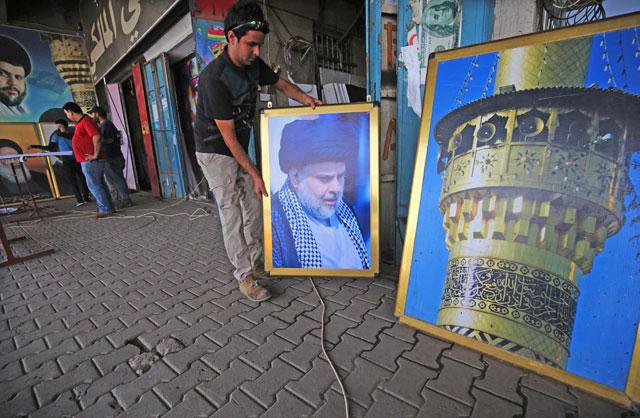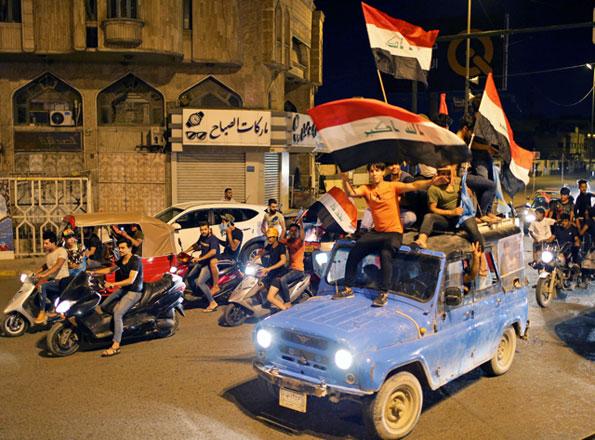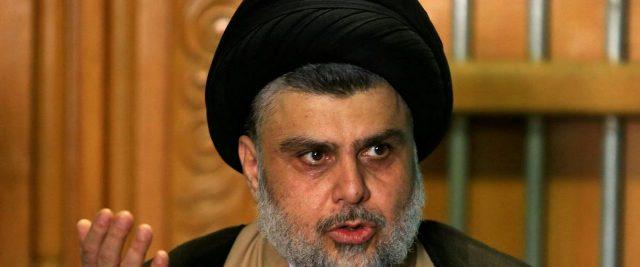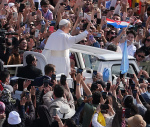You are here
Fiery cleric Sadr taps anger over Iran to lead Iraq poll
By Reuters - May 15,2018 - Last updated at May 15,2018
BAGHDAD, Iraq — Nationalist Shiite Cleric Moqtada Al Sadr took a surprise lead in Iraq's elections by tapping into public resentment with Iran and what some voters say is a corrupt political elite it supports.
Sadr is the only Iraqi Shiite leader who has challenged both Iran and the United States, a calculation that appears to have made him popular with millions of poor Shiites who felt they hadn't benefited from their government's close ties to Tehran or Washington.
The nationalist cleric's success in the election dealt a blow to Iran, which has steadily increased its influence in Iraq since a US-led invasion toppled Saddam Hussein in 2003.
His success marks a remarkable comeback for Sadr, who for years had been sidelined by Iranian-backed rivals. He reached out to dispossessed Shiites and marginalised Sunnis, and restored links with Sunni neighbours while keeping Iran at bay.
As news spread of Sadr's gains in the election, some of his followers celebrated in Baghdad and chanted "Iran out".
"Iraq is rich, the country doesn't need Iran, it can stand on its feet and be prosperous it just need good management," said Mohammed Sadeq, a trader in the city of Hilla who voted for Sadr's list.
Forty-four year old Sadr will not become prime minister as he did not run in the election but his almost certain victory puts him in a position to pick someone for the job. Winning the largest number of seats does not automatically guarantee that, however. The other winning blocs would have to agree on the nomination.
Sadr has long been viewed by the US and Iraqi government officials seen as an unpredictable maverick. But a Western diplomat, who met him in his villa in the city of Najaf just after he formed a political bloc with communists in March described Sadr as composed, articulate and a pragmatist.
"He didn't come across as a rabble rouser," said the diplomat.
Sadr, usually stern-faced, joked about the diplomat's ring. "Then he showed me his ring, which had an effigy of his father," he said.
Fierce nationalist
Sadr was virtually unknown outside Iraq before the 2003 US invasion. But he soon became a symbol of resistance to foreign occupation, deriving much of his authority from his family.
He is the son of the revered Grand Ayatollah Mohammed Sadeq Al Sadr, killed for defying Saddam Hussein. His father's cousin, Mohammed Baqir, was also killed by the Iraqi dictator, in 1980.
Sadr was the first to form a Shiite militia that fought against US troops after the liberation of Iraq turned into an occupation. He led two uprisings against US troops, prompting the Pentagon to call his Mehdi army the biggest threat to Iraq's security.
US officials and Sunni Arab leaders have accused Sadr's Mehdi Army of being behind many sectarian killings that ravaged Iraq. Sadr has disavowed violence against fellow Iraqis.
Sadr has always portrayed himself as an uncompromising nationalist. He looked down on other opposition figures who safely returned from Iran seeking power after Saddam's demise while others put their lives at risk by staying in the country.
In 2004, the US occupation authority issued an arrest warrant for Sadr in connection with the 2003 murder of moderate Shiite leader Abdul Majid Al Khoei who the Americans had brought into the holy Shiite city of Najaf during the invasion. Sadr, who denied any role, was never charged.
His image as a patriot appears to have resonated with those who voted in the election, which saw a historically low turnout.
"We won't allow the Iraqis to be cannon fodder for the wars of others nor be used in proxy wars outside Iraq," said Jumah Bahadily, a member of the outgoing parliament who belongs to the Sadrist movement, referring to Syria. "We are proud of our Arab identity."
Unlikely alliance
Sadr can easily mobilise thousands of followers on the streets of Iraq.
In 2016, hundreds of Sadr's supporters stormed parliament inside Baghdad's fortified Green Zone after he denounced politicians' failure to reform a political quota system blamed for rampant corruption.
Sadr issued an ultimatum.
"If corrupt [officials] and quotas remain the entire government will be brought down and no one will be exempt."
For the election, Sadr formed an unlikely alliance with communists and other independent secular supporters to demand the formation of a government of independent technocrats to end corruption.
His bloc, known as "Sairoon" in Arabic, or On The Move, has said it would focus on rebuilding infrastructure and providing health and education to the poor.
"The importance of this vote is that it is a clear message that the people want to change the system of governance which has produced corruption and weakened the state institutions," Raed Fahmy, secretary general of the Iraqi Communist Party, told Reuters.
"It is a message in support of having balanced relations with all based on the respect of non interference in Iraq's internal affairs."
Comeback
Sadr has made a notable comeback after being sidelined for years by Shiite rivals backed by Tehran.
Two of them were seen as top contenders for prime minister after the election.
Hadi Al Amiri is widely regarded as Iran's man in Iraq and is arguably the most powerful figure in the country. Amiri's bloc was in second place in the poll with more than half the votes counted, according to Reuters calculations.
The other is Nuri Al Maliki, who served as prime minister for a total of eight years. Maliki's bloc has so far fared poorly. Incumbent Haider Al Abadi had been tipped to win by a narrow margin.
Sadr's growing popularity has not gone unnoticed in Tehran, where he went into self-imposed exile in 2007.
Ali Akbar Velayati, top adviser to Iran's Supreme Leader Ayatollah Ali Khamenei, said in February that Tehran would prevent Sadr and his alliance from governing in Iraq.
"We will not allow liberals and communists to govern in Iraq," he said during a speech at a conference in Iraq in February.
Iraq, which lies in the heart of the Gulf, is critical for Iran. The countries share a border and Iraq is Iran's main route for supplying arms and fighters to Syria to back President Bashar Al Assad in the civil war.
Sadr and his allies "benefited from the weak participation of the other parties and from widespread popular discontent regarding corruption and the mismanagement of the state, and also the perception that Iraq is being led from outside, by the Iranians and the Americans", said Wathiq Al Hashimi, an independent analyst based in Iraq.
Related Articles
BAGHDAD, Iraq — The United States has contacted members of a political bloc in Iraq led by a former foe, the Shiite cleric Moqtada Al Sadr,
BAGHDAD, Iraq — Iran and its allies were mustering a bid Wednesday to limit the role of fiery Shiite cleric Moqtada Sadr in Iraq's next gove
BAGHDAD - Iraqi cleric Moqtada al-Sadr called on Friday for a nationwide disarmament campaign and announced his Baghdad stronghold would be

















